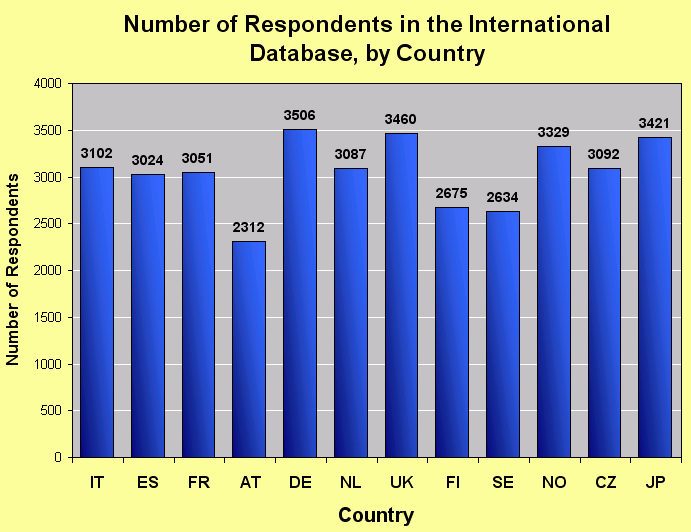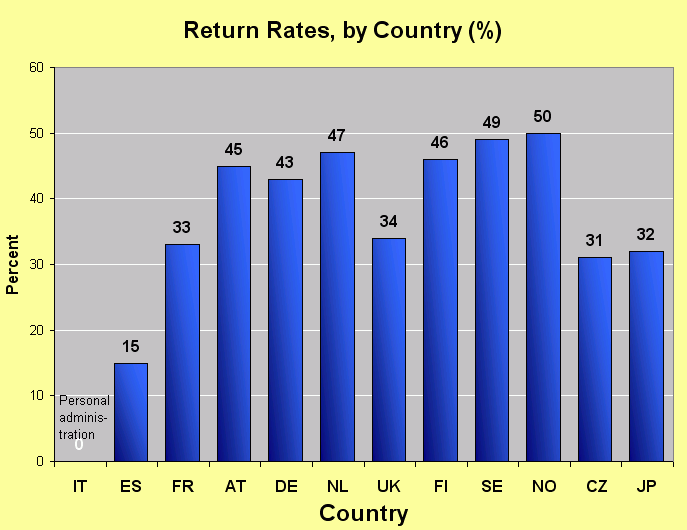Overview
In the project, researchers from 12 countries intended to develop concepts, questionnaires and survey approaches suitable for a Europe-wide analysis and to survey a representative samples of graduates from institutions of higher education in their respective countries.
A representative sample of persons who graduated between autumn 1994 and summer 1995 was drawn. About 36,000 graduates participated in the survey. The questionnaire addressed the socio-biographic profile of the graduates, their study experiences and (self-perceived) competencies acquired, their employment, work and careers since graduation and the links they perceive between education and work.
This representative questionnaire survey was supplemented by interview surveys with graduates and employers which allow for a more comprehensive understanding of the relationship between education and work. Graduates' perceptions and interpretations of their competencies, job roles and life goals were analysed in selected areas, notably those undergoing the most rapid and most challenging changes. The other interview study addressed the views held by employers.
The project put emphasis on the acquisition and utilisation of competencies as well as on the needs of the employment system in various European countries. In this context, the question was raised as to how graduate employment and work change as a response to technological developments. Finally, the project paid special attention to graduates not finding suitable employment, as traditionally conceived, or facing unemployment. Though graduates tend to fare better on the labour market than non-graduates the project had to deal also with aspects of a growing frequency of social disadvantage and exclusion.
The Research Instrument
The objectives of the survey required the use of a standardised mailed questionnaire as the core research instrument. With such a method it was possible to include a high number of graduates in each country in an efficient way as well as to elicit comparable and representative information on graduate employment and work. The development of questionnaires was based partly on the approaches and experiences of former surveys conducted in the European countries and partly on newly developed questions/items which had to overcome the pitfalls of prevailing terminologies and research approaches in individual countries.
The research teams in each country contributed to the conceptualisation of the study and the development of the questionnaires and were responsible for the translation of the "master questionnaire" into their respective language.
The major themes of the questionnaire survey were:
- Socio-biographic and early education background variables
- Study conditions and provisions
- Course of study and study behaviour
- Study achievements
- Study achievements (outcomes)
- Employment during the first four years after graduation
- Regional and international mobility
- Work content and use of lnowledge and skills
- Work motivation and job satisfaction
- Further professional education/training
Cohort of Graduates
Persons were surveyed about four years after graduation. The proposed timing, first, took into account that professional training periods after graduation, as they are required or customary in some countries in some professional areas, might last up to two years. This timing, second, allowed us to analyse the transition to employment of those graduates who - after an award of degree equivalent to a bachelor's - continued academic study towards an advanced degree. Third, this timing enabled us to identify the first regular employment of graduates after a protracted transition period. Fourth, some early career stages could be analysed on the part of those who transferred to employment shortly after graduation.
Country
The study was initially aimed to comprise nine European countries: Austria, Finland, France, Germany, Italy, Norway, Spain, the Netherlands, and United Kingdom. Parallel studies, without financial support of the EC were conducted in Czech Republic, Sweden and Japan.
Field of Study
A broad range of fields of study was addressed in order to ensure that the range of factors discussed above was well represented in the survey.
Regions
The sampling ensured that contrasting regions in terms of centrality, economic and social conditions, etc. were included.
Institutions of Higher Education and Degrees
A broad range of higher education institutions was addressed in order to ensure that the range of factors related to institutional type is well represented in the survey. Students were surveyed who have been awarded the first degree or leaving certificate in the respective countries based on between 3 and 6 years of study.
Sample Size
The sample size had to be sufficient for a detailed and systematic analysis in terms of the above-mentioned research questions. The central criteria of the sampling should have sufficient variation within each country. It should yield at least about 3,000 responses from graduates in each country.
Tracing of Names and Addresses
According to the local conditions the procedures to get the addresses of the graduates varied by country. In some countries the actual addresses of the graduates were available from a central database, while in others only addresses at the time of graduation were available from the institutions of higher education.
The Conduction of the Survey
All tasks regarding the conduct of the graduate survey (collection/updating of addresses, mailing, check of questionnaires, coding, documentation of the coding and data editing) were done by the local research teams. Two reminder actions were undertaken in most of the countries. The procedures were adapted to the specific conditions in the respective countries, based on agreed principles.
Number of respondents

Return rates

Data Analysis
The data analysis was to a great extent centrally undertaken in Kassel, i.e. at the institutional base of the project co-ordinator. However, all partners were equipped to undertake the analysis themselves. They were provided with complete data sets, thus being in a position to pursue more detailed studies regarding their respective areas of specialisation and their country in comparative perspective.
A data base with the international data file (SPSS system file) was developed by the research team at the University of Kassel. The strategies of data analysis were discussed and developed in two workshops. Special emphasis in the data analysis was put on procedures of multivariate analysis.
The Interview Studies
The graduate survey was supplemented by in-depth case-studies through interviews with graduates and employers. First, these interviews enabled the research team to investigate rationales and motives more validly because people could describe their views in more complex oral statements. Second, the open structure of interviews was chosen because it was more suitable for addressing certain issues of which prior knowledge is very limited. The overall picture of the relationships between higher education and employment/work was enriched through information gathered from employers. Thus, whereas one of the interview studies addressed a selected group of the graduates previously surveyed through written questionnaires in greater depth, the other interview study addressed the views held by employers. These interviews enabled the research teams to contextualise analyses of the graduate surveys by paying attention to the national contexts of higher education and national differences in occupational and companies characteristics.
Overall Project Co-ordination
The co-ordination was rested with the International Centre for Research on Higher Education of the University of Kassel. Ulrich Teichler and Harald Schomburg were the co-ordinators of the project both in terms of the administration of the project as well as the research process, notably the graduate survey.
INCHER-Kassel produced the International data base (SPSS system file) and assisted the data analysis of the other research groups whenever needed.
The additional studies were co-ordinated by other members of the research team. Dr. Egbert de Weert (CHEPS, University of Twente) was responsible for the employer interviews and Prof. Paul Kellermann (University of Klagenfurt) was responsible for the graduate interviews. The interviews were conducted in each country by the respective members of the research teams.
